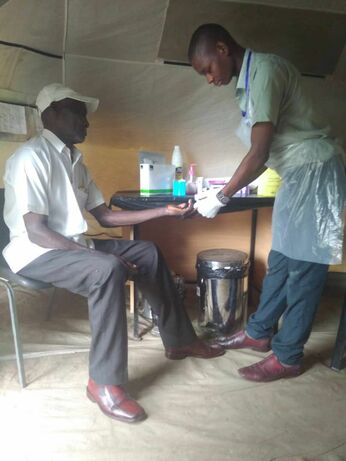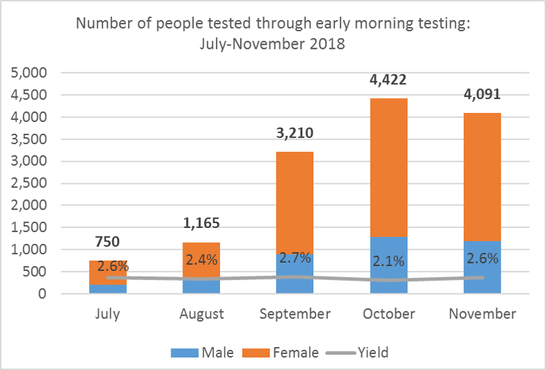Expanding HIV testing access through facility-based early morning testing in Mangochi, Malawi
|
Grivin Frank, a 66-year-old man who lives in Mangochi district, Malawi, has been reluctant to get tested for HIV: every time he came to Mangochi District Hospital, the outpatient department (OPD) was overcrowded, with long waiting times. Although Grivin wanted to know his HIV status, he wasn’t willing to wait to access testing once the OPD began to operate in the morning. For Grivin, attending to his part-time job as a builder and providing for his family were more important than taking extra time to test for HIV. However, Grivin’s attitude changed once he heard about early morning testing from the USAID-funded Tingathe program, implemented by Baylor College of Medicine Children’s Foundation-Malawi. Grivin always arrives at the hospital long before services begin to secure an early place in the line of clients waiting for the OPD to open at 8 am. Previously he was unwilling to spend additional time after his consultation in the OPD to test for HIV, but he was happy to utilize his waiting time to finally learn his status.
Early morning testing is an approach which provides HIV testing from 6 - 8 am, expanding the availability of provider-initiated testing and counselling at health facilities. In September 2018, Tingathe, in partnership with the Ministry of Health, scaled up early morning testing as one of its key testing strategies in all 36 supported health facilities in Mangochi to increase testing access and reduce overcrowding and waiting times. The strategy is particularly relevant for men, who often want to minimize their time at the health facility in order to get back to their work or business. At each health facility, a team of at least two Community Health Workers (CHWs) and three HIV Diagnostic Assistants provides health talks to waiting clients about the value of knowing one’s HIV status, screens client health passport books to identify those eligible for testing (particularly those who have never tested or tested more than three months ago), and provides testing to those who give consent. |
|
Tingathe Site and Cluster Coordinators provide oversight to ensure smooth implementation and HIV testing quality assurance. For those who test HIV-positive, Tingathe staff facilitate priority access once the OPD opens to fast-track them for initiation onto antiretroviral therapy. Early morning testing now accounts for approximately 13% of HIV tests conducted by Tingathe in Mangochi, which indicates high client uptake and acceptability. Scale-up of the approach to all supported health facilities in the district and intensified implementation has increased the number of people receiving HIV testing by five-fold from July to November 2018, with triple the number of men accessing HIV testing. While the testing yield (the percentage of people who test HIV-positive) remains consistent at approximately 2.5%, more people living with HIV have been identified due to the overall increase in the number of those testing, from 20 people diagnosed with HIV in July 2018 to 90 people diagnosed with HIV in November 2018. |
Early morning testing optimizes already-limited space for HIV testing services in the health facilities, and Tingathe staff say they have observed that men are increasingly willing to test as they have continued providing the service. As Grivin explains, “I was very happy and satisfied with the whole process. When I arrived at the hospital, I was offered the HIV health talk at 6:15 am. Thereafter, one CHW screened my health passport and found I was eligible for testing. I was willing to use my waiting time to test just to get to know my status. I was escorted to the testing point and offered counselling before and after testing. I was also very happy to be found negative and get to know that my sickness was not caused by HIV.”


